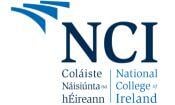
As it's Dyslexia Awareness Week, we want to highlight that at NCI, we focus on abilities rather than difficulties which students with dyslexia may experience. Our Learning and Disability Support Team provide academic support for students to help them discover a way of learning that enables them to use their strengths and skills and view dyslexia in a positive way.
While dyslexia may be seen as a stumbling block and a barrier to education, BSc (Honours) in Computing graduate, Brian Daly, shares his story with us to show how failure motivated him to work hard to achieve his goals. Brian encourages NCI students to reach out to our Learning and Disability Support Team for help as early as possible so that we can guide in a way that works for you, read his story below.
How did you discover that you were dyslexic?
Growing up I had difficulty hearing which led to a delay in my speech development. I was diagnosed with reading dyslexia in senior infants. The challenge I faced on a day-to-day basis was the fear of reading out loud in front of the class. If I knew that I was going to be called upon, I would read ahead of everyone else before it was my turn just so I would be a little familiar with the words. This challenge stayed with me all the way through secondary school.
It wasn’t until secondary school that I really noticed the difference between myself and my classmates. Homework was something everyone hated but it took me twice as long to complete. It would take me 4-6 hours while it only took most people 2 hours to complete. Another challenge I faced was exams. I was given no help, so I had no idea what study method worked for me. All I knew was that I could never finish an exam on time and I didn’t understand why. I knew all the information in my head, but I couldn’t get it down on paper fast enough. My results suffered.
This brings me onto my next challenge. My parents would give out to me for failing and call me lazy for not studying. I was trying my best and I knew I deserved better results than the one shown on my report. It wasn’t until 4th year when I took the DATs test that my guidance councillor noticed I scored particularly low in one area and advised me to get it checked out. We went to an educational psychologist and it was there that I was diagnosed with written dyslexia. Finally, I had an answer! In the report, they advised that I should get a laptop, spelling & grammar waiver and extra time for my Leaving Certificate exams. When I went back to school in 5th year, I was told that there were cutbacks and I would not be given any of the supports that I needed.
I think the biggest challenge I had to face in school was teachers telling me that I wasn’t good enough. Every week in 5th and 6th year we would have an engineering test and every week I would fail that test. I got 13% in my mock exam and afterwards my teacher told me that I was a failure and wouldn’t get far in life. After the one day practical and project was added to the Leaving Cert exam, he was shocked that I got one of the best grades in the class. My maths teacher gave out to me every single day because I had done the homework a different way than the way she was teaching. I wasn’t trying to do it on purpose its just the way my brain would solve the problem. She told me I couldn’t rely on my own methods for the exam but fortunately, she was wrong. I got an A in maths.
How has the Learning and Teaching team supported you during your time in NCI?
The Learning and Teaching team has been incredible and have made a huge difference to my experience in college. My only regret is that I didn’t seek help sooner. I came into 1st year looking for a clean slate. Unfortunately, I missed about two weeks of college due to personal issues and began falling behind. While I was trying to catch up on the work I missed, the weeks just kept passing by and I figured, why bother putting in anymore work? What I didn’t think of at the time was the consequences of my actions.
I ended up failing four modules while my friends were going into 2nd year. I had four repeats and I had no idea how to prepare for them. During the summer, I received an email from the college regarding a ‘Getting to Grips’ session on Mind Maps. I had nothing to lose so I decided to go. It was presented by the Learning and Teaching office. After the session, I waited for everyone to leave because I felt like this might be my last chance to ask for help. I told them about my situation and she shared something that I didn’t believe at the time, “you are not alone”. The next day, we had another chat and we planned for my repeat exams. This was the first time in my life that I felt prepared for any upcoming exam. In the end, I repeated my first year and had two repeat exams in 2nd year with one in 3rd year.
My goal is to have no repeats in my final year. Ever since that ‘Getting to Grips’ session, I've had a support tutor every week. She is the reason why I am still in college. I have failed over and over and over again but that is why I will succeed.
One of the best things about the Learning and Teaching team is their hunger for every student to fulfil their potential. They are honestly some of the best people I have ever met in my life. They believed in me when literally no one else did, not even my family. She has supported me through all the good and bad times and is hands down my biggest inspiration!
What was the turning point which encouraged you to embrace your dyslexia?
Again, the Learning and Teaching team is the reason why I now embrace my dyslexia. For a long time, I had a negative mindset. I was fed up of constantly feeling like a failure and my family always comparing me to my older sister who has two degrees and would have no problem studying for 10 hours while I struggle to sit still for 30 minutes. I was tired of never getting anything easy. It was only in 3rd year that I began to embrace my dyslexia.
During our weekly meetings, my tutor helped me to see the other side of the coin. I couldn’t run away from my dyslexia so why not use it to my advantage. Having dyslexia is a gift. I can see things a little differently to everyone else which is useful for team projects, I might be able to add something someone else might not have thought about.
Did you know that 40% of all self-made billionaires are dyslexic? Stephen Spielberg, Whoopi Goldberg, Muhammad Ali, Richard Branson and Kiera Knightly are all dyslexic and hugely successful in their area. I began to research more about dyslexia and in doing so began to understand myself better. I came to realise that I can and I will succeed in life with dyslexia.
How has the challenges you faced driven you to succeed?
I have already experienced so many failures in my life that failure won’t scare me anymore. I have had to work twice, maybe three times as hard as anyone else just to stay above water. This has instilled a strong work ethic and a never give up attitude inside me. As part of 3rd year, we were required to complete a six-month work placement as part of our course. I had four interviews and heard nothing back. Again, I was frustrated that all the employers could see was my grades at the bottom of my CV and nothing about the type of person I am.
During one of my meetings with my tutor, I received a phone call from Deloitte inviting me to an interview. In the interview, they asked me why my grades were below average and I explained that I have always struggled with exams but I was working hard at trying to improve on them. For the entire interview I talked about my dyslexia. I told them that I can think outside the box and can see things a little differently to other people. Finally, I told them that if they gave me a chance, I would be the best intern they have ever seen. The next day I received the job offer.
For six months I worked extremely hard during my placement with Deloitte and went above and beyond to help the team no matter how big or small the task was. At the end of my employment review, I received the highest grade an employee can get: Grade 1. I also received a job offer to return once I complete my degree. I have always known I was good enough and thankfully someone in Deloitte took a chance to allow me to show my skillset.
“There are no limitations, unless you create them yourselves. Anything is possible. You are only limited by your own imagination” – Dolores Cannon.
What advice would you give to other dyslexic students who may be struggling with their studies?
It’s okay to fail. I have failed a thousand times and I am still here. If you are struggling with anything, ask for help sooner rather than later. Don’t make the same mistake I did and wait until your first year is over. The journey is difficult, there will be a lot of bumps along the way, but I can promise you that you will be better off. Rome wasn’t built in a day so try and accept that it might take you a little longer, but you will get to your destination. Embrace your dyslexia and embrace that you are different to other people.
Brian Daly studied the BSc (Honours) in Computing at National College of Ireland. If you have any questions about the learning supports available at NCI, submit a request to the NCI Support Hub and our team will be delighted to help!










